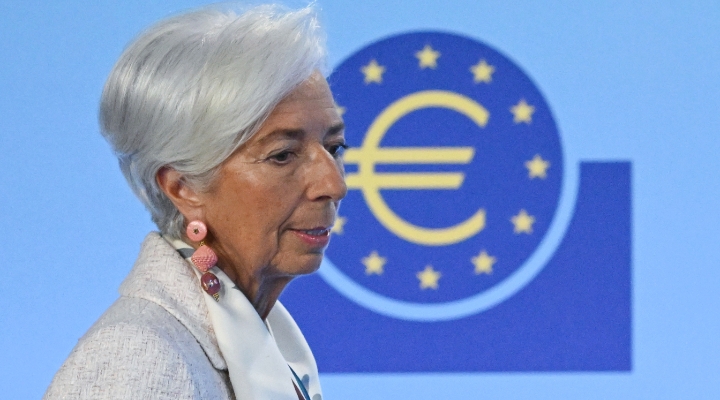
As expected, the European Central Bank (ECB) decided to hold interest rates unchanged in its last meeting of the year on Thursday. Its central bankers also reiterated no further rate hikes will be needed to keep inflation at bay. ECB President Christine Lagarde then told reporters the governing board "did not discuss rate cuts at all".
In updated forecasts, the bank significantly lowered its inflation outlook from previous September projections for both 2023 and 2024. It now expects headline inflation to average at 5.4% in 2023, down from a September forecast of 5.6%, and cut guidance to 2.7% from 3.2% for 2024.
"While inflation has dropped in recent months, it is likely to pick up again temporarily in the near term due to base effects," Lagarde stressed.
Strong wage growth, together with falling productivity, means domestic prices remain elevated. In addition, upside risks to inflation come from heighetend geopolitical tensions in the Middle East and extreme weather events.
Meanwhile, the euro has continued its upward trend against the US dollar following the rate decision. The currency had already jumped higher following the Fed's rate decision Wednesday, which weighed on the greenback. Equity markets shed value on the news as market players had hoped for clearer signals of rate cuts.
How Will ECB Dovishness Affect Me?
Observers view Thursday's decision as the first sign of more expansive monetary policy. This was a "first tentative dovish shift", says Carsten Brzeski, economist at ING bank.
"The [latest] statement signals that at least the end of rate hikes is here. The fact that the phrase 'inflation is expected to remain too high for too long' is gone [is important].
"At the same time, however, the phrase that 'rates will be set at sufficiently restrictive levels for as long as necessary' is still in the official communication", he notes.
Before Thursday's meeting, financial markets had already priced in ECB rate cuts by a total of 150 basis points for next year.
Lagarde then highlighted wage cost pressure is still too high and financing conditions on the market need to remain tight. That "sent a clear signal against rapid and extensive interest rate cuts", says Johannes Mayr, chief economist at Eyb & Wallwitz. However, weak economic data is likely to put this resolve to the test in the coming months, he adds.
The ECB also announced it will tighten its balance sheet and gradually phase out the reinvestments under the Pandemic Emergency Purchase Programme (PEPP) in the second half of 2024.
"It is therefore likely to prepare for a first interest rate cut in the second half of 2024", says Michael Holstein, chief economist at DZ Bank. This is later than many market participants expected, especially after Wednesdays dovish Fed meeting, he says.
"The wait-and-see attitude makes sense, as the economy and in particular the stable labour market do not force immediate action", he adds.
What Will Happen to The Eurozone?
The Bank's economists expect economic growth to remain subdued in the near term. Beyond that, the economy is expected to recover because of rising real incomes – as people benefit from falling inflation and growing wages – and improving foreign demand.
It therefore sees growth picking up from an average of 0.6% for 2023 to 0.8% for 2024, and to 1.5% for both 2025 and 2026. In the third quarter, the eurozone's economy contracted by 0.1%.
However, the ECB is the central bank most likely to have overtightened; and possibly to a significant extent, according to Quentin Fitzsimmons, senior portfolio manager at T. Rowe Price.
The US Federal Reserve had decided to leave interest rates unchanged Wednesday, and so did the Bank of England (BOE) und the Swiss National Bank (SNB) Thursday. Norway's central bank chose a different path and decided to raise the policy rate from 4.25% to 4.5%.
"We see that the economy is cooling down, but inflation is still too high", governor Ida Wolden Bache said, adding that Oslo is done hiking rates.
Back to the US, the federal-funds rate currently stands at a target range of 5.25%-5.50%, following hikes of five percentage implemented from March 2022 to July 2023. And most attention at last week's meeting centered on whether the Fed would signal any upcoming rate cuts.
"We believe that six cuts will take the federal-funds rate down to 3.75-4.00% by year-end 2024," says Preston Caldwell, Morningstar's US chief economist.




























